I’ll let the films and my opinions speak for themselves, but let me say this was a banner year for films, from the box-office hits to the critical darlings to the hidden gems. Before I reveal the core 15, some brief thoughts on the 10 movies that didn’t make it:
- Blue Jasmine, a continuation of Woody Allen’s late-era renaissance with career-best work from Cate Blanchett and an astounding, left-field supporting turn from Andrew Dice Clay.
- The Conjuring, the scariest film since The Descent with a maximized atmosphere and minimal blood. Nine years after Saw, James Wan hits the jackpot on the genre that started his career.
- Escape Plan, better than the Expendables films and the Stallone/Schwarzenegger comeback we’ve needed all along.
- Frances Ha, a delightful zero-in on the paranoia of the quarterlife crisis. Greta Gerwig is tremendous here.
- Inside Llewyn Davis, the return of the Coen Brothers and backed by the best original lineup of film music since Crazy Heart.
- Mud, where Matthew McConaughey continues his incredible reinvention in this affecting Southern coming-of-age drama.
- Only God Forgives, Nicolas Winding Refn’s beautiful, surreal, unsettling follow-up to Drive, a psychological nightmare besieged with entrancing cinematography.
- “Safe Haven,” Gareth Evans’ transcendent entry into V/H/S/2 and the only entry of both films to deserve being its own feature.
- Spring Breakers, a satirical insight into the sex-crazed, drug-fueled heart of the modern counterculture, boasting iconic work from James Franco as a Kevin Federline-esque hip-hopper who bolds the “gangsta” in “gangsta rap.”
- White House Down, the most fun Roland Emmerich has had since Independence Day and a summer blockbuster that had no right failing or being as good as it was.
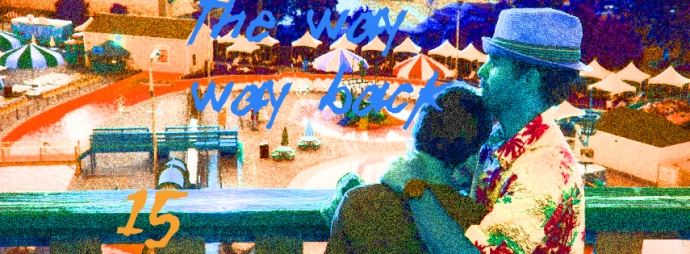 Don’t die wondering, man.
Don’t die wondering, man.
Like its lonely teenage protagonist, The Way Way Back was well hidden amongst the class of ’13. It is poignant, charming, gut-bustingly funny. Jim Rash and Nat Faxon, who won Oscars for co-scripting The Descendants, make their directorial debut on a coming-of-age dramedy that simultaneously recalls rowdy summertime fare like Meatballs and GORP without resorting to sophomoric nonsense to advance the story. From the shaggy Cape Cod scenery to the authenticity of its performances and characters, The Way Way Back never feels obliged to be stylized. Unlike last year’s The Perks of Being a Wallflower—where its quirkiness felt intentional without self-awareness—it never feels drowned in that. We can believe a kid like Duncan (newcomer Liam James) is trying to break out of his shell. We can believe a mother can be an embarrassing wino like Allison Janney’s loudmouthed neighbor, or that Sam Rockwell’s water park czar could be that charismatic. Plus, judging by his nasty and intimidating work here, Steve Carell is going to be a hellraiser in Foxcatcher.
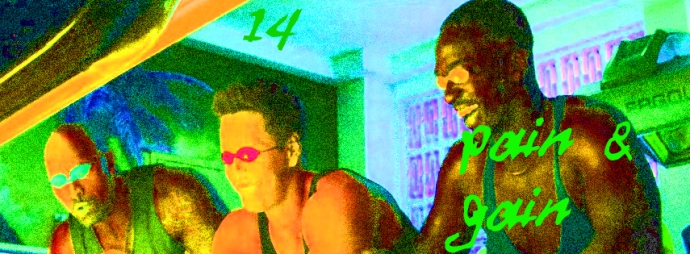 Unfortunately, this is a true story.
Unfortunately, this is a true story.
With its pitch-black sense of humor aimed right at the out-of-control crime spree of the Sun Gym gang, Michael Bay has not only made his best film since The Rock—it may be his masterpiece. With a stranger-than-fiction true story as the basis, this loud-and-proud bombastic action roots to an excessive, Coens-on-meth crime comedy that recalls De Palma’s Scarface and George Armitage’s Miami Blues in its satirical slant and hapless dark comedy. Bay brings out an evil side from Mark Wahlberg as the thuggish Daniel Lugo, whose ambitions to be fitness king of Miami are clouded by his ruthless demeanor. Anthony Mackie’s Adrian Doorbal is passively shaped into a clone of Lugo, while Dwayne Johnson’s reformed prison choirboy is the conscience of the group. Filled with enough manic energy to outdo a protein shake with a few grams of coke in it, Pain & Gain is a fluorescent orgy of criminal excess. We laugh at their stupid decisions because the Sun Gym gang’s fate is inevitable, and in the end, these three guys are emblematic of the worst kind of pursuit of the American Dream: watching too many movies and taking them for granted. Certainly, morals be damned, Bay would never want that.
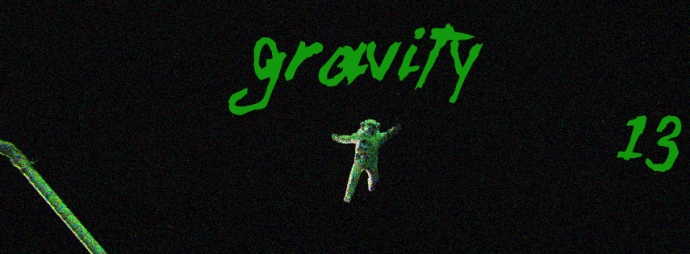 I get it, it’s nice up here. You could just shut down all the systems, turn down all the lights, just close your eyes and tune out everyone. There’s nobody up here that can hurt you. It’s safe. What’s the point of going on? What’s the point of living? Your kid died, it doesn’t get any rougher than that. It’s still a matter of what you do now. If you decide to go then you just gotta get on with it. Sit back, enjoy the ride, you gotta plant both your feet on the ground and start living life. Hey, Ryan, it’s time to go home.
I get it, it’s nice up here. You could just shut down all the systems, turn down all the lights, just close your eyes and tune out everyone. There’s nobody up here that can hurt you. It’s safe. What’s the point of going on? What’s the point of living? Your kid died, it doesn’t get any rougher than that. It’s still a matter of what you do now. If you decide to go then you just gotta get on with it. Sit back, enjoy the ride, you gotta plant both your feet on the ground and start living life. Hey, Ryan, it’s time to go home.
Since Avatar, 3D has merely come across as a cash grab for studios to put a little more shock-and-awe in the theater experience (and the box office numbers). With Gravity, Alfonso Cuarón has raised the bar even higher than Avatar did and made the first 3D film that not only benefits from 3D, it requires it. Visual effects so beguiling you’d be hard-pressed to not think a major studio sent two major actors on a NASA retreat. At that, Cuarón has created the most realistic depiction of outer space thanks to the expert art direction and Emmanuel Lubezki’s stunning cinematography. The realism at hand brings about a study in loneliness and fear, attributes brought to heart-stopping fruition by Sandra Bullock in the performance of her career. Not since the original Alien has space been this terrifying or unfamiliar, and worse yet, there are no monsters here. The only antagonists are perceived threats by Bullock’s Dr. Ryan Stone, whose bare-bones character development is enough that you want to see her make it back to Earth—and the anxiety you feel, she feels.
Of all the shots in the film, the one that will stick with me for decades is Stone, crying, her tears floating into the ether. So many shots composed by Cuarón could testify to how you properly use 3D, but that one sticks out. Oh, and he just one-upped Jim Cameron on how to use the technology.
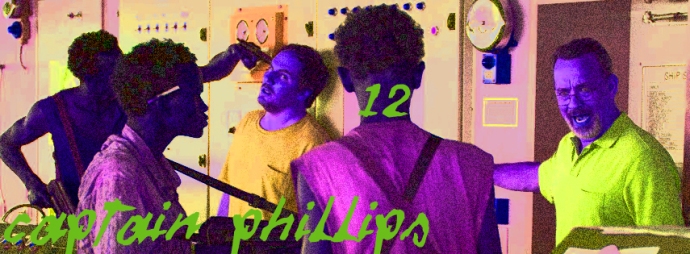 The coward always dies.
The coward always dies.
Just because Richard Phillips’ 2009 ordeal with Somalian pirates became one of the year’s most inspiring and talked-about events doesn’t mean that Paul Greengrass can’t keep you tipped over on the edge of your seat for two hours. Captain Phillips is the director’s best since United 93, and as such he follows the same docudrama format of the film. Even with Tom Hanks as the designated star of the film, Greengrass manages to reel us into a hyper-real account of the incident, one that we could conceivably buy happening. Hanks gives his best performance since Cast Away as Phillips, and by casting an actor as widely loved as him, there is never a need for action heroics from the character. Greengrass is a straight shooter, sacrificing deep character development for the same kind of survivalist tension seen in Gravity, and by casting unknowns around Hanks—most remarkably newcomer Barkhad Abdi as the charismatic lead pirate—he takes material that would otherwise be glossy and manipulative and turns out an acutely powerful and suspenseful thriller.
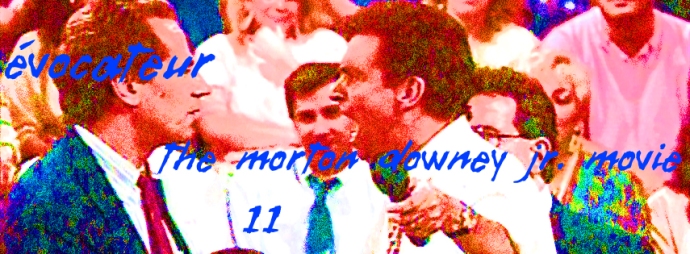 Some people said I was the first rock-and-roll star to come along without music.
Some people said I was the first rock-and-roll star to come along without music.
“I’m always amazed at what people will fall for,” David Letterman said of Morton Downey Jr. “We see this every ten or twelve years, an attempt at this, and I guess from that standpoint I don’t quite understand why everybody’s falling over backwards over the guy.” Within months of his eponymous talk show’s 1987 debut, Morton Downey Jr.’s popularity soared as a sexist, volatile, right-wing ringmaster who screamed and blew cigarette smoke in guests’ faces, an act that would effectively serve as an allegory for not only his attitude of the people he interviewed but his career as a whole. Seth Kramer, Daniel A. Miller and Jeremy Newberger zero in on an equilibrium that taps into the insanity of Downey’s 15 minutes of fame while treating it with a calming reverence. Évocateur: The Morton Downey Jr. Movie is the year’s most magnetic documentary, a shameless chronicle of a conservative pundit whose grandstanding persona predated today’s beyond-opinionated era of GOP-skewing journalism on Fox News and among personalities such as Rush Limbaugh and Glenn Beck. It is a riveting story, the rise and fall of a would-be American icon, an ambulance-chasing crusader whose arrogance and deplorable lengths to preserve his name cost him advertisers, producers, his family, and finally, his life.
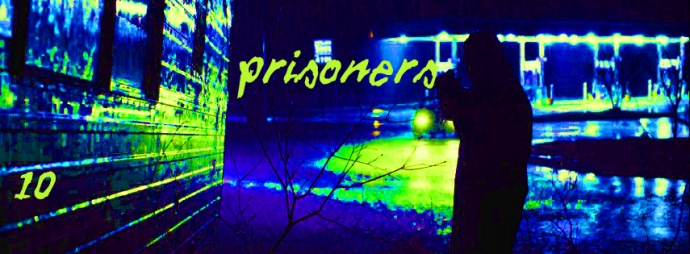 Making children disappear is the war we wage with God. Makes people lose their faith. Turns them into demons like you.
Making children disappear is the war we wage with God. Makes people lose their faith. Turns them into demons like you.
Prisoners is the kind of disturbing, eye-gluing thriller that deserves every right to hold its own with films like Manhunter, The Silence of the Lambs and Seven. Every performance is noteworthy, from the career-best lead turns from Hugh Jackman and Jake Gyllenhaal, to the grieving and determined roles played by Terrence Howard and Viola Davis, to Maria Bello’s depression-tinged wife and the kookiness of Melissa Leo and Paul Dano. Propelled by the ever-beautiful photography by Roger Deakins and Denis Villeneuve’s underscored direction, it is at once a procedural drama and an unsettling revenge film that takes its perception of the story and subject matter in a grave, traumatizing manner. The whodunit at the heart of Prisoners is unsettling because its characters are unsure of the motives, stubborn in how to cope with their grief. Seeing Jackman’s Bible-thumping handyman Keller Dover and Gyllenhaal’s Eagle Scout-like police detective Loki (a role akin to his work in Zodiac) finding themselves challenged by frustration and incompetence is pulled off so effortlessly that its psychological crescendo rings truer than it possibly could. And nowadays, seeing a film this mature pulled off so brilliantly is a feat in of itself.
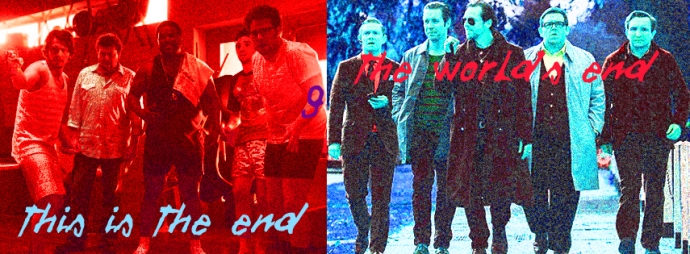 A huge earthquake happens, who do they rescue first? They’ll rescue Clooney, Sandra Bullock… me. If there’s room, you guys will come.
A huge earthquake happens, who do they rescue first? They’ll rescue Clooney, Sandra Bullock… me. If there’s room, you guys will come.
Get back in your rocket and fuck off back to Legoland you cunts!
I couldn’t choose just one over the other. For my money, This is the End and The World’s End represent the best true comedies of 2013 and both share the common thread of friendships tested on the bring of the apocalypse. They are vulgar, surprisingly action-packed, howlingly funny films whose grungy façades hide big, sweet, cynical hearts underneath. They are, surprisingly, both genre-bending comedy fusions.
This is the End sends up the stratospheric rise of Seth Rogen, James Franco, Jonah Hill, Danny McBride, Craig Robinson and other Apatow regulars as finding their egos tested by the apocalypse. Each actor has their perceived public characters dialed up past eleven, a joke that Rogen (who co-wrote and directed with Evan Goldberg) takes as being cause for the Rapture. The result is a delightfully gory, outrageous fratboy take on John Carpenter’s Apocalypse Trilogy. Of note: Robinson’s deadpan reactions. Franco and McBride’s extended argument about a climaxed-on porno mag, the funniest single scene of the year.
The World’s End, meanwhile, is the last and possibly the best of Edgar Wright’s deconstructive Cornetto Trilogy, which, after this film and the preceding Shaun of the Dead and Hot Fuzz, has cemented Wright as the United Kingdom’s answer to Quentin Tarantino. Here, he brings back Simon Pegg and Nick Frost for a high-energy sci-fi comedy that recalls both Don Siegel and Philip Kaufman’s versions of Invasion of the Body Snatchers and John Carpenter’s They Live in its ode to anti-conformity. The element of friendship, especially that of the circle who is forced into reclaiming their unfinished pub-crawl glory by Pegg’s rambunctious Gary King, is strengthened in the face of the alien force. The brilliance of Wright is his encyclopedic understanding of cinema through the eyes of experiencing it firsthand and twisting it towards his own liking, like Tarantino. However, it is the nonstop dry British wit and genuine bond among its characters that makes The World’s End ever so freed from feeling derivative.
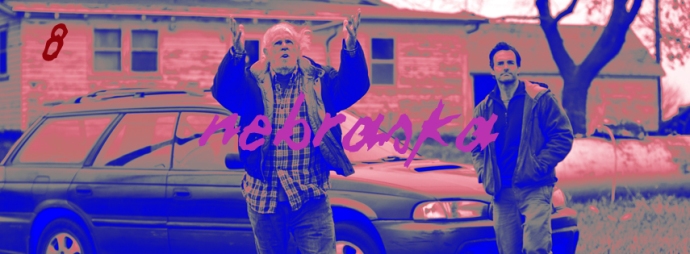 I won a million dollars.
I won a million dollars.
Like Woody Grant, its wiry, boorish protagonist, this is a film lost in time. Beautifully stripped of color and defined by its rustic identity, Alexander Payne has delivered a sumptuous, heartfelt and often hilarious character piece that generously sprouts the director’s keen eye for quirkiness throughout. Ultimately, however, it is a triumphant story about the importance of family and the necessity of forgiveness, that the strangest and most uncanny circumstances will bring people together. Emerging from the halls of great character actors is the 77-year-old Bruce Dern, who is as unhinged as ever as the frequently confused but stoic Woody, a curmudgeon whose obsession with a $1 million prize he must claim in Lincoln drives together his long-suffering wife (the hilarious June Squibb) and skeptical son (a dryly underscored Will Forte). Payne’s zeal for the offbeat riches of small-town folk is his oyster, and mining its sense of humor from the characters’ bickering and the obliviousness shown to the industrial world. In that regard, this is a quintessential fable of Middle America, a brilliant story of problems presented and lessons learned amongst modest but whimsical people.
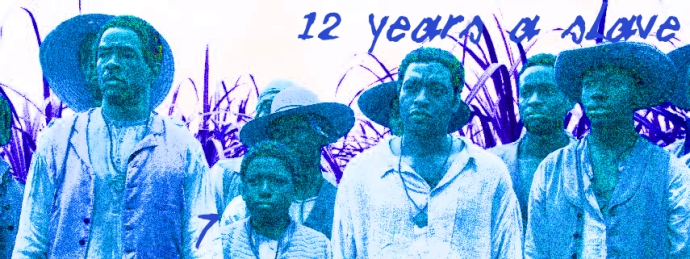 I don’t want to survive. I want to live.
I don’t want to survive. I want to live.
Not much hasn’t been said already about the virtues of 12 Years a Slave that I feel uncertain what else I have to add to the conversation. Steve McQueen’s film is one of the most harrowing accounts of the black experience ever made, a humane study in the tolerance of diversity and endurance. His contemplative direction brings alive the harsh brutality of the mid-1800’s with an unrelenting, raw eye for juxtaposing Sean Bobbitt’s majestic cinematography with the unpleasant realities of what is indisputably the darkest regret of American regret. Chiwetel Ejiofor vanishes into the role of Solomon Northup as he witnesses the lowest depths of humanity unravel before him. When he is first dragged into his plight, he stays laconic, conveying his thoughts and emotions with his expressive, forlorn eyes. Ejiofor plays towards the survival and desperation to make not only himself believe, but for the audience to see his light. The gradual boiling over of Solomon’s humiliation makes for the riveting core of the film, and the strive to break free correlates to the opening of our souls. It also goes without much explanation to praise Michael Fassbender’s sadistic work as God-fearing tyrant Edwin Epps, whose mystic, leading-man eyes turn to doom in his performance, becoming the antagonist of not only the film but of all-encompassing morality.
Personal instinct tells me I will never watch this film again, but I am obliged this film and its towering achievement. There are images, shots, moments that will stay with me for the rest of my life, and its enlightenment on how our darkest moments can lead to the ultimate redemption will remain in my heart—and, I hope, yours.
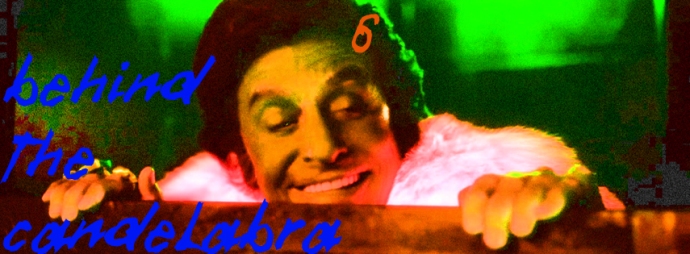 All of a sudden, we’re sounding like a gay Lucy and Ricky. “Oh, Ricky, you wouldn’t fuck me up the ass if you loved me!”
All of a sudden, we’re sounding like a gay Lucy and Ricky. “Oh, Ricky, you wouldn’t fuck me up the ass if you loved me!”
I couldn’t give a flying fuck with anybody trying to argue me about the inclusion of a purported “TV movie” on this list. Just because Steven Soderbergh’s last film (for now?) made its premiere on HBO doesn’t deny its cinematic prowess and achievement, and it does that in the kind of decadent style Mr. Showmanship never came into the public eye without. Simultaneously hilarious, heartbreaking and romantic, Behind the Candelabra shares the same glamor as last year’s Magic Mike in the stunning tastefullness that Soderbergh approaches the insatiably engrossing tabloid excess surrounding Liberace and Scott Thorson’s torrid romance. Both Michael Douglas and Matt Damon are astonishing in their contributions, with the former pulling off an emulation of Liberace so accurate in its grandiosity and hysterics it may give susceptible audiences nightmares. Never once does it come into play that the 43-year-old Damon is playing a man in his twenties and he provides us our reason to believe, an exploited young man whose exposure to the bleak reaches of showbiz result in irrevocable damage to his life. Perhaps what sticks out about Behind the Candelabra, however, is its success in adding together these unsettling situations and the darkly comedic sections without a feeling of misguidance. I’ve been quoting this movie for months now and I adore the thing to pieces. And Rob Lowe’s freakshow plastic surgeon—proponent of “the California diet”—is arguably scarier than most real-life plastic surgery nightmares.
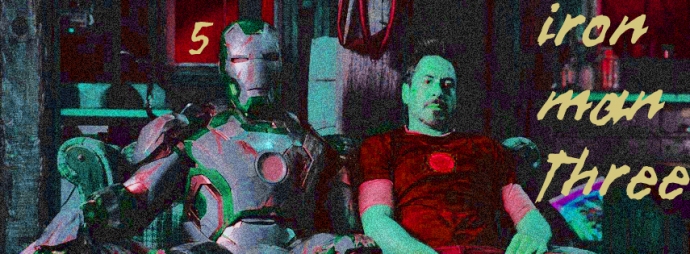 A famous man once said, “We create our own demons.” Who said that? What does that even mean? Doesn’t matter. I said it ’cause he said it. So now, he was famous and that basically getting said by two well-known guys. I don’t, uh… I’m gonna start again.
A famous man once said, “We create our own demons.” Who said that? What does that even mean? Doesn’t matter. I said it ’cause he said it. So now, he was famous and that basically getting said by two well-known guys. I don’t, uh… I’m gonna start again.
What happens when Marvel hands over writing and directing duties on their follow-up to The Avengers (not to mention the third iteration of their most financial successful film property) to the acid-tongued, delightfully cynical creator of Kiss Kiss Bang Bang and The Last Boy Scout? Anarchy. Absolute fucking anarchy. Iron Man Three is a deliberate and razor-sharp demolition of the superhero genre that refuses to play by the rules of what Marvel had ever done with the property beforehand. No annoying AC/DC music cues. No face-offs with another man who built himself a bigger suit. No cutesy teasers for other properties, not even an appearance by S.H.I.E.L.D. or Nick Fury. Shane Black isn’t interested in a superhero movie: Iron Man Three is a political detective story whose protagonist just happens to be an ex-industrialist whose bum ticker allows him to use a metal suit that blows shit up, and it has no fear in letting the audience know that it wants to be different. From the moment Tony Stark’s self-aware narration (effectively playing up Robert Downey Jr.’s ever-nimble performance as a variation on his Kiss Kiss Bang Bang character) kicks in, it’s entirely indicative of Black’s other great work (right down to the Christmas setting!) and its postmodern theories about post-9/11 America and its reflection in summer blockbusters is sublime.
I love everything about this movie. That Don Cheadle gets so agitated. That Downey Jr. and Gwyneth Paltrow’s chemistry is as great as ever. That, without saying anymore, Ben Kingsley is the fucking best in this. That it decides to turn into an 80’s buddy cop movie for an action sequence, complete with Stark firing guns akimbo, a tropical mansion hideout and a ponytailed henchman. That Stark befriends a kid in a way that would freak normal parents out. That William Sadler and Miguel Ferrer play the President and Vice President. That Guy Pearce’s leering villain played up like he was the bastard son of Mr. Joshua from Lethal Weapon.
And it was the second highest grossing movie of the year. Thanks, America.
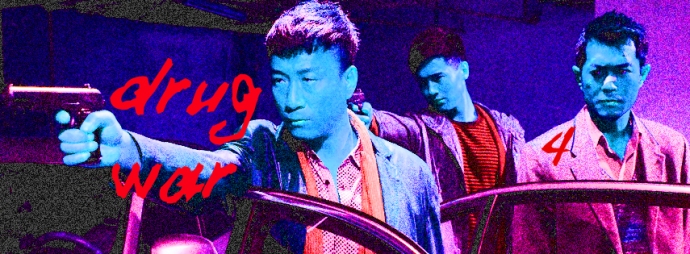
Talk about a movie that doesn’t fuck around. Johnnie To’s Drug War is a shattering, exhilarating crime drama whose understanding of the fragile line between cop and criminal echoes William Friedkin’s To Live and Die in L.A. and Michael Mann’s Heat in its unrelenting swagger and our skeptical allegiances to the two leads. Honglei Sun’s Zhang Lei is a cop whose fearsome streak originates from his exhaustive pursuit of the crystal meth empire that Louis Koo’s suave Timmy has cemented himself into in high regard. Neither man ever has a solid sense of trust for each other because they are both so good at their respective jobs, and Zhang has the upper leg on the societal hierarchy. Unfortunately, Zhang’s overvalues himself and, like the criminal he has trapped, finds himself in too deep after he overdoses playing the role of another drug lord. It’s at that moment that Drug War ceases being a typical procedural, even a variation on the heroic bloodshed genre. This is a film about consequence, about the boundaries that push its devoted players over the edge and past the point of salvation. What Drug War lacks in hope, it makes up for in the form of its hardiness. No one is a hero, there are only people ordained with business and its maintenance. In that regard, there are elements that could resemble Greek tragedy, albeit with tense drug deals and Peckinpah-esque public gunfights against the neon allure of Hong Kong. Even if the film owes a debt to the aforementioned American auteurs, the Eastern outlook of Drug War is a darkly meditative, spiritual bliss.
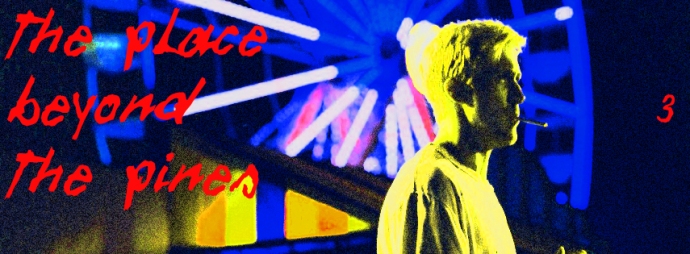 When I was a kid, I used to look at my dad dressed in judge’s robes and I used to think that my father was a superhero. And I don’t think I was far off. He had that quality that judges have where they have tremendous compassion, but they’re also ferocious at the same time. He wasn’t afraid of making enemies. I think that’s probably why he had so many friends.
When I was a kid, I used to look at my dad dressed in judge’s robes and I used to think that my father was a superhero. And I don’t think I was far off. He had that quality that judges have where they have tremendous compassion, but they’re also ferocious at the same time. He wasn’t afraid of making enemies. I think that’s probably why he had so many friends.
Not since No Country for Old Men has a film had such a dark, uncompromising outlook on morality and irony. Every emotional dilemma and ethical judgment hits the audience the same way it comes towards the characters. Derek Cianfrance has announced himself as an auteur and storyteller whose voice echoes Scorsese and Coppola in grit and scope. This is a beautiful, literary journey into the heart of darkness, boasting two of the best actors of this generation, Ryan Gosling and Bradley Cooper, delivering superb performances. Somewhat similar to his iconic turn in Drive, Gosling’s Luke is an adrenaline-seeking loner whose connection to us is grayed by a mean streak. Cooper, however, gives career-best work as Avery Cross, an ambitious man whose honor and courage cannot be seen as fully commendable by a world besieged in the financial and personal benefits of long-reaching corruption. Eva Mendes and Chronicle‘s Dane DeHaan are also brilliant here and only serve as part of a massive achievement. Its three-act structure is among the most creative this year and weaves three distinctive stories into one sprawling generational piece: a gritty, Scorsese-esque neo-noir, a cop drama that Sidney Lumet would’ve approved of, and a pitch-black coming-of-age tale in the vein of films like Over the Edge and River’s Edge. Mike Patton’s score triumphs. Huge points for being one of the best-looking films shot on digital yet, thanks to 12 Years a Slave photographer Sean Bobbitt, who atmospheric nighttime scenes and cleanly composed shots make it every bit as filmic as good ol’ 35mm.
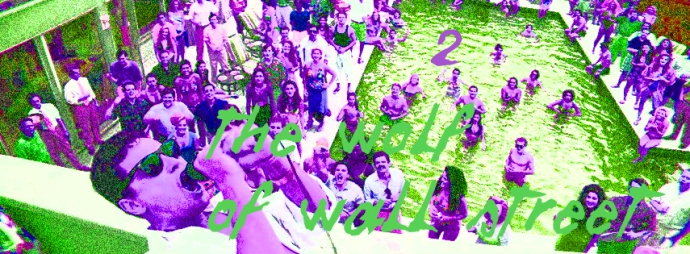 Let me tell you something: there’s no nobility in poverty. I’ve been a poor man, and I’ve been a rich man. And I choose rich every fucking time.
Let me tell you something: there’s no nobility in poverty. I’ve been a poor man, and I’ve been a rich man. And I choose rich every fucking time.
Remember when I called This is the End and The World’s End the best “true” comedies of 2013? Well, let’s just fuck the objective and say that The Wolf of Wall Street is, bar none, the funniest, ballsiest, most buck-wild cinematic experience of the year. At 71, Martin Scorsese has proven to be more capable of directing a film full of adrenaline (or Quaaludes, if you want to be proper like the film) that some directors half his age could never muster the sheer charisma of. It boasts Leonardo DiCaprio’s best work as an actor. A watershed moment in Jonah Hill’s career as a degenerate with Osmond Family teeth. This is a three-hour film about the exploits of Jordan Belfort, whose reign as the financial industry’s most shrewd, hardest-partying con artist is portrayed as the nadir of good taste and a cautionary tale in materialism. Scorsese’s decision to play the film as his first comedy since After Hours works as we laugh at the fact that this morally bankrupt buffoon actually flaunted wild parties, participated in rampant prostitution play, drug use and midget tossing. Its rollercoaster of hedonism is of paramount importance in today’s critical economic state, that this is a cautionary tale of what happens when you have too much money and no clue of how to manage it. No other movie this year has presented itself as fearless to go to the shocking and uncompromising extremes that The Wolf of Wall Street goes to. Entering his sixth decade as one of the greatest filmmakers alive, Martin Scorsese has achieved what will undeniably be considered one of his best and most loved films—even if people are smitten with it for the wrong reasons.
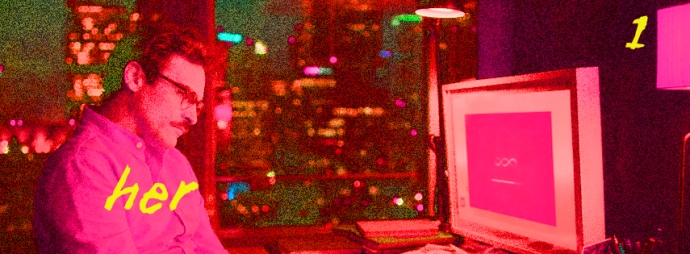 Sometimes I think I have felt everything I’m ever gonna feel. And from here on out, I’m not gonna feel anything new. Just lesser versions of what I’ve already felt.
Sometimes I think I have felt everything I’m ever gonna feel. And from here on out, I’m not gonna feel anything new. Just lesser versions of what I’ve already felt.
Consider the immense role that the Internet may play in your life, in addition to the massive shadow of your smartphone. The constant ability to be connected to the world, to your friends, at any and every time of your waking life. In the future, these innovations will advance so greatly that our brains will connect to the Internet and they will disconnect from humanity. This is the lingering dilemma of Spike Jonze’s masterful futuristic love story Her, a generational touchstone that ably marries the technological quirks of Philip K. Dick with the romantic neurosis of Woody Allen. Our protagonist, Theodore Twombly (an emotionally accessible Joaquin Phoenix) finds himself shuttered into writing the letters of strangers, living a lonely life after a failed marriage, only to rebound from the advent of OS1, who produces a conscious companion named Samantha (beautifully voiced by Scarlett Johansson). Spike Jonze’s vision of the future takes a bright, sunny Los Angeles that contrasts the murky side of the future city in Blade Runner, while his eloquent screenplay lacks troubling cynicism and allows for the existential struggle of Theodore to be healed by love and encouragement. When his date with a charming, beautiful woman (Olivia Wilde) goes sour, we feel awful because he could not come out of his shell. His friendship with Amy (played with wonderful sensitivity by Amy Adams) is a mutual connection felt in their losses, while his breakup with estranged Rooney Mara seems to be a matter of incompatibility, not scorn. For years to come, Her will be cemented as one of the most unique science fiction stories of our time, with Jonze’s multitasking being only a small piece of why its relevance will soar.